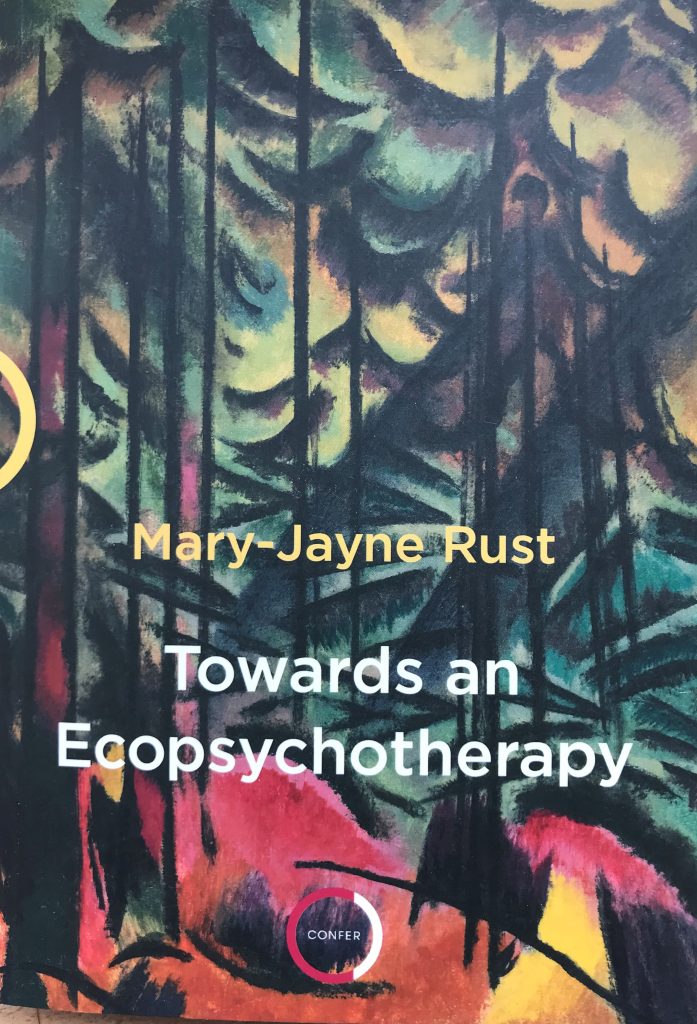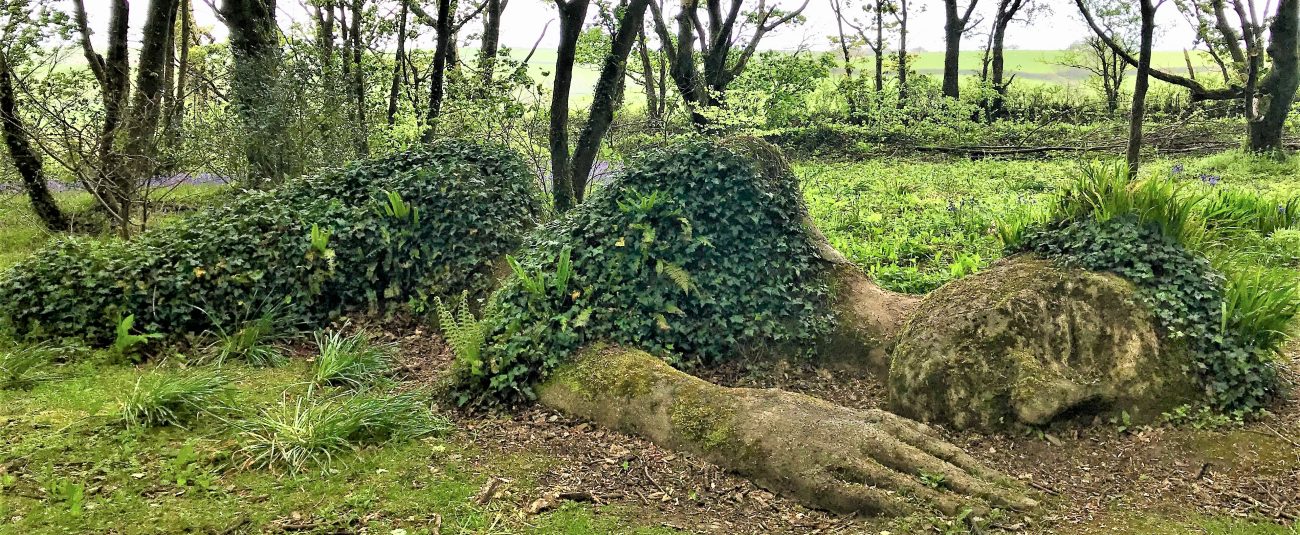My New Book

Psychotherapy invites us to tell the story of our human relationships; ecopsychotherapy expands this to include our earth story, the context or continuum in which our human relationships sit. Ecopsychotherapy is not simply a technique to be applied in therapy: it involves a change in perspective. While practising therapy outdoors is a radical shift that can support and facilitate the healing process, it also acknowledges that our relationship with the earth is both inside and outside ourselves. As climate chaos quickens and increasing numbers of people are waking up to the seriousness of our environmental crisis, we are becoming more aware of our dysfunctional relationship with the earth – the body on whom we depend for everything. Ecopsychotherapy can help to support our reconnection with nature and to discover hope in turbulent times.
“Mary-Jayne Rust has written an important work which broadens the field of psychotherapy to include our inherent connectedness to the more-than-human world. She provides a succinct, heartfelt overview of ecopsychotherapy. Given the current state of global environmental destruction, the wisdom in this book is needed now more than ever.” Jeffrey T Kiehl, Jungian analyst, climate scientist, author of Facing Climate Change
“In her characteristic style, Mary-Jayne presents ecopsychotherapy in an incisive way, with her richness of experience bringing the subject to life. This thought-provoking book touches on the heart of controversies in this field – our need to grow new terminology – and to actively ensure our spaces are inclusive. This is an invaluable introduction to ecopsychotherapy and is also sure to deepen the work of more seasoned practitioners.” Emma Palmer, Body psychotherapist, BACP-accredited counsellor, ecopsychologist, supervisor, trainer and author of Other Than Mother: Choosing childlessness with Life in Mind
“An intelligent and beautifully written contribution to an important new development in psychotherapy, one which will be increasingly important in the future. Mary-Jayne Rust is a recognised pioneer in the field, and we are fortunate to have her share her experience with us.” Nick Totton, Psychotherapist, trainer and author of Wild Therapy: Undomesticating Inner and Outer Worlds
“If psychotherapy is to remain relevant, it must change and recognize that we exist as part of, not apart from, Nature. I trust Mary-Jayne Rust more than anyone else to guide us there.” Jerome Bernstein, Jungian Analyst, author of Living in the Borderland: the Evolution of Consciousness and the Challenge of Healing Trauma
“As humans we are not apart from the ecosystem. Our being-ness is interwoven with earth, sky and all that lies between. In this beautifully written book, Mary-Jayne Rust shares her considerable experience as a psychotherapist working ecopsychotherapeutically within the greater context of our planetary situation and current ecological and climatic crises.’ Caroline Brazier, psychotherapist, author of Ecotherapy in Practice – A Buddhist Model
Reviews
‘Towards an ecopsychotherapy’ is a short summary of everything relevant to this field of study. If you are new to ecopsychology and the various therapeutic approaches that it has given rise to, this is an excellent introduction. Mary Jayne Rust explains complex concepts and arguments lucidly and simply and weaves together the disparate strands of ecopsychology effortlessly. It is an excellent introduction, yet even those who are already well-informed, will find this book well worth reading. As an emerging subject, it is easy to find the different terms used for similar ideas by different writers confusing. In presenting these overlapping but not identical terms, the clarity with which they are discussed is most helpful. The gathering of the threads, the exploration of how they are connected, the central themes and how they play out in the different spheres considered is enlightening.
Ecopsychotherapy is an approach that broadens the focus of therapy from human relationships to our relationship with the ‘other than human’ world. In this brief introduction, this approach is set in the context of other aspects of ecopsychology, such as the diversity of practices influenced by ecopsychology, the theoretical frameworks from which it has been developed, anthropocentrism, how the ecological crisis is/isn’t part of the dialogue occurring between client and therapist, some of the limitations and criticisms of the field, and beyond individual work to collective action ‘as we stumble towards creating an ecological civilisation’ (p 118).
With such comprehensive coverage in a short text, no topic is considered in depth. However, there are ample references to other sources, so that any of the strands can easily be pursued. This is one of the things that most impressed me. Mary Jayne’s breadth of scholarship means that for the references alone, this book is worth buying. Every single subject introduced is embedded in a network of sources so that not only are all relevant areas covered, but behind that there is an extraordinary depth of understanding and knowledge. It is one of the things that makes this book so satisfying to read. And, as someone who is relatively knowledgeable, I am excited to find new material to explore.
I found the concept of ‘parallel process’ of particular interest. This is the recognition that the distress experienced due to our relationship with ‘the other than human’ and that resulting from human interactions are interwoven. Both need to be considered within the therapeutic relationship. It is important to recognise that ‘Extinction anxiety may contribute to addiction, anxieties, and other mental health problems’ (p 83). The exploration that followed a client’s comment on unseasonably warm weather illustrates this point. It was an observation that could easily be overlooked as a ‘chance remark’ but, once reflected back, the resulting discussion revealed a connection between concerns about global problems and the client’s presenting issue.
This is a book that I have no hesitation in recommending to anyone who wants to know what ecopsychotherapy is and, indeed, is the best summary of the entire field of ecopsychology that I have yet encountered. A real gem.
By Dearbhaile Bradley for PCSR Journal, 2020.
